News
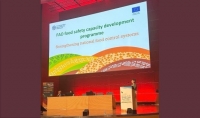
18/09/2024
At the IUFoST World Congress on Food Science and Technology, FAO presented its ongoing efforts in improving national food control systems using the FAO/WHO Food Control System Assessment Tool. The tool, developed jointly by FAO and the World Health Organization, provides a structured, transparent, and evidence-based method to assess food control systems across the entire food chain, from production to consumers, enabling countries to implement targeted strategies for measurable and sustainable improvements.
The session emphasized the critical role of science and risk analysis in support of food control systems, as highlighted by the tool. Based on Codex Alimentarius principles, one...
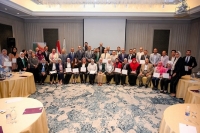
13/09/2024
The Food and Agriculture Organization of the United Nations (FAO) in cooperation with the National Food Safety Agency (NFSA), concluded an eight-month assessment of Egypt’s food control system with a final workshop held in Cairo from 9-12 September 2024.
Stakeholders, experts, and officials from various ministries within Egypt’s food control system convened to review the assessment’s findings. The group endorsed the recommendations, established priorities and developed a roadmap aimed at enhancing the country’s food safety framework.
Speaking at the Strategic Workshop in Cairo, Dr Tarek El Houby, Chairman of the National Food Safety Agency (NFSA), stressed...

12/09/2024
An article by FAO authors has been published in Nature on the opportunities and challenges for global food safety in advancing circular policies and practices in agrifood systems.
A shift from linear practices in agrifood systems to circularity aims to do “more with less”, reducing waste by closing material and processing loops. However, the adoption of circular practices is rarely preceded by a full understanding of the food safety hazards that may arise from these processes.
The review article, co-authored by Andrew Pearson, Keya Mukherjee, Vittorio Fattori and Markus Lipp of FAO’s...
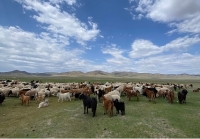
03/09/2024
The use of antimicrobials in agriculture and food production has significantly contributed to improved animal welfare and safer production systems. These medicines are the only way to treat bacterial diseases and remain a critical piece of global agri-food systems.
However, overuse and misuse of these critical tools can lead to the development of Antimicrobial Resistance (AMR), which not only threatens human health but also undermines the long-term viability of agricultural production. This global health crisis, if left unaddressed, could diminish decades of progress in healthcare and agriculture.
Ensuring these medicines remain effective in the decades to...
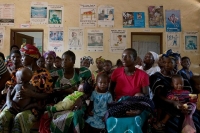
14/08/2024
Food is a basic necessity for life. Yet foods can also be associated with adverse health effects, including those resulting from dietary exposure to chemical substances, whether naturally occurring, process-induced, or in the form of additives or contaminants.
FAO has released a

05/08/2024
The Food and Agriculture Organization of the United Nations (FAO) will organize a global meeting on whole genome sequencing (WGS) for food safety and water surveillance within the One Health framework. The call for applications is now open until 4 November 2024 for those who would like to be considered to participate in the meeting.
WGS identifies the DNA sequences of an organism, significantly contributing to a better understanding of variations within and between species of various foodborne and waterborne pathogens. Because the genomic information of such species significantly varies among different geographical areas, having a global collaboration would...

24/07/2024
FAO convened a Technical Meeting on Gut Microbiome in Food Safety Chemical Risk Assessment from December 12 to 14, 2023. A group of experts representing various regions and disciplines, ranging from toxicologists to specialists in microbial ecology engaged in chemical risk assessments and microbiome research programs, convened to discuss key aspects in the field.
The discussions centered around assessing the suitability, gaps, and requirements of microbiome-related data for chemical risk assessments, alongside exploring microbiome-host interactions and their biological significance.
During the meeting, the experts identified the conditions and developments that need to take place in order...
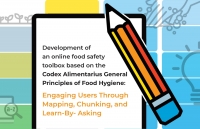
22/07/2024
It is crucial to understand and become familiar with the Codex General Principles of Food Hygiene and how the principles contained therein are integrated into legislation or influence national, regional, public, and private standards. However, engaging with formal texts...

17/07/2024
Farhati Mohamed Rachid a joué un rôle déterminant dans la coordination du projet de la FAO « Renforcement des capacités et de la gouvernance en matière de contrôle alimentaire, phytosanitaire » aux Comores, qui a été le premier des 12 pays à mener une évaluation du système de contrôle alimentaire. L'évaluation s'est achevée avec succès il y a quelques mois et un plan d'action stratégique a été approuvé par le gouvernement. Nous avons interviewé Mme Rachid pour connaître son point de vue sur le projet et son impact aux Comores.
Vous pouvez lire l’interview en anglais et...
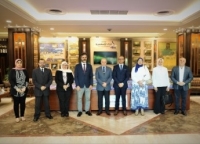
17/07/2024
A recent FAO mission in Egypt concluded last week, marking an important step in a project aimed at strengthening food safety and plant health capacities and governance across 12 African Union countries. The three-week mission involved comprehensive field visits to diverse sites, including national and regional authorities, ports, border points, food laboratories, warehouses, and various establishments along the food supply chain.
As Saber Mansour, FAO Food Safety Officer, noted, "Field visits, meetings, and discussions with all stakeholders along the food chain in Egypt allowed us to better understand how the system is designed and operated, ensuring that...
Stay up to date and connect to our RSS feed!
